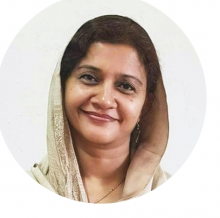2019 OWSD-Elsevier Foundation Award winners announced
Five women scientists from Bangladesh, Bolivia, The Gambia,Nepal and Palestine are recognized for their accomplishments in biological sciences.


The winners of the 2019 OWSD-Elsevier Foundation Awards were announced Wednesday, 13 February, in Washington, D.C. The five early career researchers living and working in Bangladesh, Bolivia, The Gambia, Nepal and Palestine have been recognized for their work in environmental microbiology, ethnobotany, clinical pediatrics and epidemiology. The prize also acknowledges the scientists' commitment to leading and mentoring young scientists, and to improving lives and livelihoods in their communities and regions.
"These scientists are performing ground-breaking international-level science, often in circumstances where the deck has been stacked against them," said Jennifer Thomson, President of the Organization for Women in Science for the Developing World (OWSD). "They deserve to be honored and celebrated for their dedication not only to their research, but to creating a better world for people to live in."
The five researchers are:
- Tabassum Mumtaz of the Bangladesh Atomic Energy Commission (Asia Pacific region); in environmental microbiology;
- Uduak Okomo of the London School of Hygiene & Tropical Medicine in the Gambia (Africa region); in pediatrics and epidemiology;
- Narel Paniagua-Zambrana of the National Herbarium of Bolivia and Universidad Mayor de San Andres (Latin America and the Caribbean region); in ethnobotany;
- Tista Prasai Joshi of the Nepal Academy of Science and Technology (Asia Pacific region); in environmental microbiology; and
- Amira Shaheen of An-Najah National University in Palestine (Arab region); in epidemiology.
"Each year, it is inspiring to find out just how much of the research undertaken by our winning scientists focuses on crucial challenges addressed by the UN Sustainable Development Goals: creating sustainable bioplastics in Bangladesh; preserving traditional plant knowledge in Bolivia; reducing disease transmission to newborns in Africa; removing arsenic from water in Nepal; and investigating the health care system response to gender violence in Palestine," said Ylann Schemm, Director of the Elsevier Foundation. "In addition, working with OWSD and the AAAS to celebrate the success of these talented women scientists is both an honor and a joy."
Each award winner received USD $5,000 and was presented her prize at the annual meeting of the American Association for the Advancement of Science (AAAS) in Washington, D.C., during a special breakfast ceremony on 16 February. In addition, each award winner received a generous private donation of USD $2500 from Gilbert Omenn and Martha Darling, to be spent on research consumables (as in 2014-2018).
Past OWSD-Elsevier Foundation Award winners have been recognized by their country's presidents and celebrated by local, national and international media. They have received other prestigious awards and fellowships including L'OREAL-UNESCO For Women in Science Fellowships and the British Council Award.
You can read more about each Award winner below, or in more detail in the linked biographies available for download. The full press release is also linked below.
For information on previous award winners, see: https://owsd.net/awards/past-awardees
The 2019 OWSD-Elsevier Foundation Awardees
Asia-Pacific region
Environmental microbiology
Principal Scientific Officer,
Institute of Food and Radiation Biology,
Atomic Energy Research Establishment,
Bangladesh Atomic Energy Commission
Dr. Tabassum Mumtaz, an environmental microbiologist from Bangladesh, works on the conversion of biomass and other waste materials into useful compounds using bacteria. Her work contributes to directly removing harmful materials from the environment as well as generating renewable energy in the process. She specializes in producing polyhydroxyalkanotes (PHAs), bioplastics produced by special bacteria that are cultivated from compost, food waste and wastewater, such as the effluents from palm oil production. She received her PhD in Environmental Biotechnology from Universiti Putra Malaysia, under an OWSD PhD fellowship. After a post-doctoral position at the University Kebangsaan Malaysia, she returned to the Bangladesh Atomic Energy Commission, where in addition to her research as a Principal Scientific Officer, she trains students in laboratory techniques for microbiology. She has acted as a reviewer and has publications in several high-impact journals. She is the author of “Changes in the properties of LD-PE during biodegradation in soil.” Dr. Mumtaz’s current research focuses on the remediation of wastewater by gamma radiation and the capability of radio-resistant bacteria for PHA production. In the future, she hopes to implement projects related to biohydrogen and bioethanol production from biomass. She believes that focusing on pollution abatement and renewable energy and valuable green bioproducts can be achieved through collaborations with industries such as textile dyeing. These developments will have a big impact on the energy consumption of Bangladesh in the near future.

